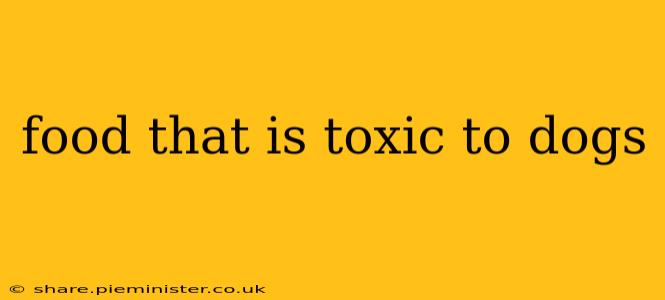Dogs, our beloved furry companions, often share our meals, begging for scraps and seemingly enjoying whatever we eat. However, many common human foods are highly toxic to dogs, leading to serious health issues or even death. Understanding which foods are dangerous is crucial for responsible pet ownership. This comprehensive guide will explore various toxic foods, their effects, and what to do in case of ingestion.
What Human Foods Are Toxic to Dogs?
Many seemingly harmless foods pose a significant threat to canine health. Some of the most dangerous include:
-
Chocolate: Containing theobromine, a methylxanthine compound, chocolate can cause vomiting, diarrhea, hyperactivity, increased thirst, and even death in severe cases. Dark chocolate and baking chocolate are particularly dangerous due to their higher theobromine content.
-
Onions and Garlic: These belong to the Allium family, containing compounds that damage red blood cells, leading to anemia. Both raw and cooked forms are toxic.
-
Grapes and Raisins: The toxic substance in grapes and raisins remains unidentified, but ingestion can cause kidney failure in dogs. Even small amounts can be dangerous.
-
Macadamia Nuts: These nuts contain unknown toxins that can cause weakness, tremors, hyperthermia, and vomiting in dogs.
-
Xylitol: This artificial sweetener, commonly found in sugar-free gum, candy, and baked goods, causes a rapid release of insulin, leading to a dangerous drop in blood sugar (hypoglycemia). It can also cause liver failure.
-
Avocado: Avocados contain persin, a toxin that can cause vomiting and diarrhea in dogs.
-
Alcohol: Even small amounts of alcohol can be fatal to dogs. It can cause vomiting, diarrhea, central nervous system depression, and even death.
-
Yeast Dough: Raw yeast dough expands in the stomach, producing gas that can cause pain and potentially rupture the stomach. Additionally, the fermentation process produces ethanol, which is toxic to dogs.
-
Cooked Bones: While raw bones can be beneficial for dental health, cooked bones splinter easily, causing internal damage and injuries to the mouth and digestive tract.
-
Caffeine: Similar to chocolate, caffeine is a stimulant that can cause anxiety, restlessness, vomiting, and increased heart rate in dogs. This includes coffee, tea, and energy drinks.
What are the Signs of Food Poisoning in Dogs?
Recognizing the signs of food poisoning is critical for prompt veterinary intervention. Symptoms can vary depending on the toxic substance and the amount ingested, but common signs include:
- Vomiting
- Diarrhea
- Lethargy
- Loss of appetite
- Tremors
- Seizures
- Difficulty breathing
- Increased thirst
- Abdominal pain
What Should I Do If My Dog Eats Toxic Food?
Immediate action is vital if you suspect your dog has ingested toxic food.
- Identify the toxic substance: Determine what your dog ate and how much.
- Contact your veterinarian or an animal poison control center immediately. They can provide guidance based on the specific toxin and your dog's condition.
- Do not induce vomiting unless instructed by a veterinarian. This can sometimes worsen the situation.
- Gather information: Be prepared to provide details about your dog (breed, age, weight), the toxic substance, and the amount ingested.
- Follow the veterinarian's instructions carefully.
Are there any foods that are mildly toxic to dogs?
Some foods aren't as immediately dangerous as those listed above, but they can still cause digestive upset or other problems in dogs. These include:
- Milk and dairy products: Many dogs are lactose intolerant, causing gas and diarrhea.
- Salty foods: Excess salt can lead to sodium ion poisoning, causing vomiting and diarrhea.
- Fatty foods: Rich, fatty foods can cause pancreatitis, a serious inflammation of the pancreas.
- Raw meat and eggs: These can contain bacteria harmful to dogs.
It's always best to err on the side of caution and avoid feeding your dog human foods whenever possible. A balanced diet specifically formulated for dogs is crucial for their health and well-being.
How can I prevent my dog from eating toxic food?
Prevention is key! Here are some tips to keep your dog safe:
- Keep toxic foods out of reach: Store all potentially dangerous foods securely, preferably in cabinets or sealed containers.
- Supervise your dog closely: Never leave food unattended when your dog is present.
- Train your dog: Teach your dog "leave it" and "drop it" commands to prevent them from snatching food.
- Be aware of hazards outside: Be vigilant about what your dog might find when walking outdoors.
- Educate others: Ensure everyone in the household understands which foods are toxic to dogs.
By understanding the dangers of toxic foods and taking preventative measures, you can help ensure your canine companion lives a long, healthy, and happy life. Remember, when in doubt, always consult your veterinarian.
